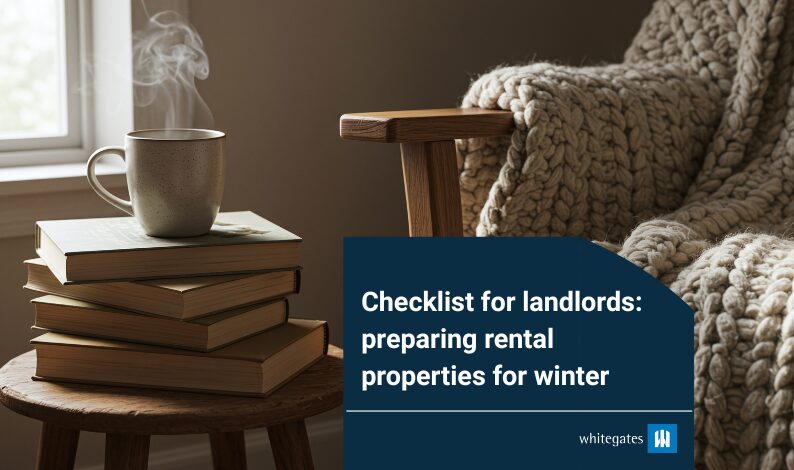When winter arrives, it’s not just frosty mornings and early sunsets that creep in. Cold weather can reveal weak spots in your rental property, leading to urgent repairs and unhappy tenants.
But with the right plan, landlords can stay ahead of the season. Think of this as your winter-ready action plan, designed to help you protect your investment, keep your tenants safe, and avoid those costly emergencies.
Related: Great winter property maintenance tips for your home
Keep your heating system working efficiently
A broken boiler on the coldest day of the year is every landlord’s nightmare. Don’t wait for things to go wrong.
- Book your boiler service early. Annual servicing keeps your warranty valid and spots issues before they worsen.
- Check that radiators are heating properly. Bleeding them can remove trapped air that affects performance.
- Insulate exposed boiler pipes to avoid freezing.
- Make sure the thermostat works well and is easy for tenants to use.
Installing a smart thermostat can help you monitor energy use and identify problems early.
Protect pipes from freezing and leaks
Frozen pipes are one of the most common winter emergencies. But most issues can be prevented with a few simple measures.
- Add pipe insulation to areas like lofts, garages, and under sinks.
- Ask tenants to keep the heating on low, even if they are away from home.
- Remind them where the stopcock is and how to turn off the water if needed.
Even small leaks can cause big problems. Encourage tenants to report cold spots, damp patches, or low water pressure as soon as they notice them.
Check your roof, gutters and drains
Your roof and drainage system work hardest in winter. Damage that seems minor now could lead to major issues once the rain, snow or ice sets in.
- Look for missing roof tiles, loose flashing, or signs of wear.
- Clear out gutters and remove leaves, moss, and debris.
- Check that downpipes are firmly attached and draining properly.
- Look around the base of the property for signs of pooling water.
Flat roofs deserve extra attention. They are more likely to leak after heavy rain or repeated freezing and thawing.
Control damp, mould and condensation
Mould and damp don’t just affect how a home looks. They can cause health issues, damage possessions, and even lead to legal action if not dealt with properly.
Here’s how to prevent problems from building up:
- Fit extractor fans in bathrooms and kitchens, and make sure they’re working.
- Advise tenants to open windows regularly, even for short periods.
- Apply mould-resistant paint in areas prone to condensation.
- Ask tenants not to place furniture directly against cold exterior walls.
Landlords are legally responsible for fixing serious damp and mould problems caused by structural or ventilation issues. Prevention is always better than a cure.
Related: Top tips for safeguarding your property from damp
Stay compliant with winter safety rules
Every landlord has legal safety responsibilities. Winter is a good time to double-check you’ve covered them all.
- Fit smoke alarms on every floor. Test them and record the check.
- Install carbon monoxide detectors where needed, ideally near the boiler.
- Arrange annual Gas Safe checks for gas boilers.
- Make sure emergency contacts are up to date, including for tradespeople.
Safety checks are not just legal requirements. They also build trust with tenants and reduce the risk of emergencies.
Improve insulation and energy efficiency
Keeping the property warm helps avoid complaints and protects your long-term investment.
- Seal draughts around doors, windows and letterboxes.
- Top up loft insulation to 270mm where possible.
- Use thermal blinds or thick curtains to reduce heat loss.
- Swap out old bulbs and appliances for energy-efficient options.
- Review your EPC rating. All rented properties must be rated E or above.
Making your property more energy-efficient helps tenants save on bills, which can increase their satisfaction and tenancy length.
Related: How to improve your property’s EPC on a budget
Support tenants through the winter season
Your tenants play a key role in keeping the property safe and warm. Good communication helps them understand how to spot issues and what to do.
- Send a helpful winter reminder with key tips and emergency numbers.
- Include advice about heating use, ventilation, and preventing frozen pipes.
- Encourage them to report repairs early, before problems get worse.
- Provide a clear route for raising urgent maintenance requests.
Most tenants want to take care of their home. Make it easy for them to do so by giving them the information they need.
FAQs
What should a landlord’s winter property rental checklist include?
It should cover heating systems, plumbing and insulation, roof and gutter maintenance, damp prevention, legal safety checks, and communication with tenants.
How often should landlords service boilers before winter?
Boilers should be serviced once a year by a Gas Safe engineer. Ideally, schedule this before cold weather begins.
How can landlords prevent frozen pipes and leaks?
Insulate pipes, check for draughts, and advise tenants to keep heating on low during absences. Make sure they know how to shut off the water supply.
Who is responsible for damp and mould in a rental property?
Landlords are responsible for damp caused by structural issues or poor ventilation. Tenants must also ventilate the home properly and avoid excess condensation.
What safety checks must landlords complete every winter?
Check smoke and CO alarms, service the boiler, and ensure heating systems are working. Inspect the property for hazards like loose roof tiles or blocked gutters.
What is the best winter home maintenance checklist for UK landlords?
The best checklist is practical and preventative. Focus on heating, insulation, plumbing, roofing, damp control, legal compliance, and clear tenant guidance.
Prepare your rental for winter with Whitegates
The best time to prepare your rental property for winter is before the cold sets in. With a bit of planning and the right support, you can avoid emergencies, protect your property, and keep your tenants comfortable all season long.
Want expert advice or a winter-ready property health check?
Start with a free, no-obligation valuation or speak with your local Whitegates team.




